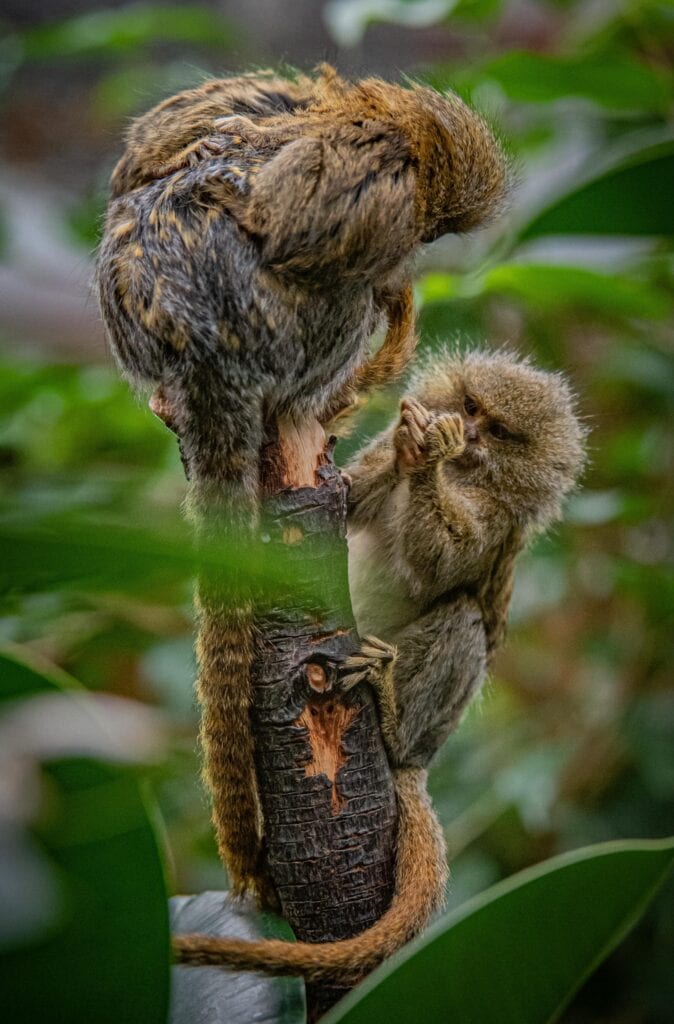The population at Chester Zoo has just increased again, with the arrival of two tiny baby eastern pygmy marmosets who were no bigger than ping pong balls when they were born.
Find out more from Chester Zoo here …
The pair of eastern pygmy marmosets, one of the most miniature primate species on Earth, arrived to parents Zoe (3) and Baldrick (4).
The tiny twins each measure just two inches (five centimetres) in length and weigh no more than 10 grams.
Keepers say the babies are already “highly inquisitive” but are so small that it will be some time yet until their genders are known.
“It’s wonderful to see new additions within the marmoset family and it’s almost unbelievable just how small the babies are when they are first born. They are no bigger than a ping pong ball!
Mum Zoe and dad Baldrick have jumped straight into parenthood. Zoe is ever so caring and, unlike other primates, dad is heavily involved in the upbringing of the youngsters. Baldrick sensed that Zoe was ready to give birth and even put on a little extra weight to give him the energy to care for the twins. He’s really got stuck into the parenting – we spotted him carrying the babies around on his back when they were just one day old.
New babies always strengthen family bonds and some of the younger primates in the group have also been carrying the new arrivals around. It’s great to see them learn and pick up parenting tips from Zoe and Baldrick, and that experience will be important if they one day go on to have young of their own. The fact that younger members of the family are trusted to carry around such delicate new-borns, builds a lot of trust within the group.
The babies are already very inquisitive and aware of their surroundings. I can’t wait to see them develop their own little personalities.”
Holly Webb, a Primate Keeper at the zoo
The eastern pygmy marmoset is native to the rainforests of western Brazil, south-eastern Colombia, eastern Ecuador and eastern Peru. These miniature monkeys are threatened by habitat loss and often exposed to hunting or their capture for the pet trade.
Dr Nick Davis, Deputy Curator of Mammals at the zoo, said:
“Many primate species around the world are highly threatened, often due to large-scale habitat destruction, hunting and the illegal wildlife trade. Sadly, this is very much the case for the eastern pygmy marmoset.
Despite their tiny stature, pygmy marmosets make a lot of loud noises, especially when calling out to attract a mate or warning others of danger. Even though they are the world’s most miniature species of monkey, their whistles and squeals can be heard throughout the rainforest. Unfortunately, as their forest homes continue to disappear, this can be to their detriment, as a lack of cover leaves them even more exposed to illegal hunters and trappers. Thankfully, conservation teams are working hard to restore forest and create safe areas while new arrivals at the zoo help us to further highlight what needs to be done to prevent their extinction.”
Pygmy marmosets are social animals, have one mate for life and their tails are longer than their bodies, which helps keep them balanced as they pass from branch to branch through the forest. They grow to around eight inches long and just 130g.
The word marmoset originates from the French word “marmouset” which means shrimp and their gestation period is around four-and-a-half months. The species has specialised diet which includes insects, fruit and tree sap.




